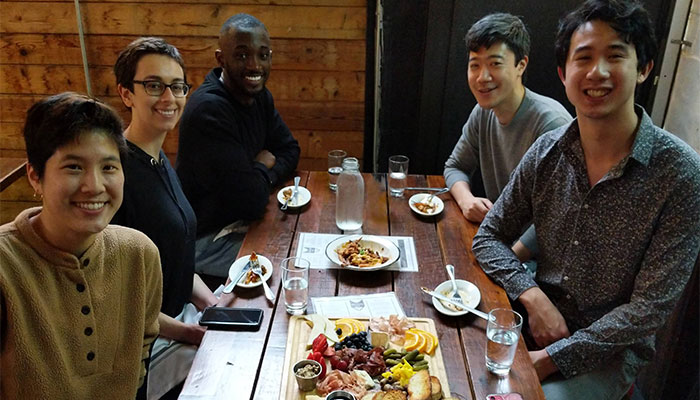HOW CAN WE HELP YOU? Call 1-800-TRY-CHOP
In This Section
‘Making Sure to Share Knowledge:’ Faculty Spotlight With Peter Choi, PhD

Peter Choi, PhD
Editor's Note: Welcome to our monthly Faculty Spotlight series, in which we sit down with faculty members at Children’s Hospital of Philadelphia Research Institute to learn more about their research and roles. Through these spotlights, our readers meet the diverse, dedicated, and distinctive individuals who lead our research community in our mission to improve children’s health. This year, we will be asking our featured scientists about mentorship — why it matters and how it has influenced their careers. In this Q&A, we feature Peter Choi, PhD, scientist in the Department of Pathology and Laboratory Medicine and the Choi Laboratory. Stay tuned for more from our Faculty Spotlight series throughout this year!
How long have you been at CHOP, and can you tell us a little bit about your current research specialty?
I started my lab at CHOP in January 2019. My lab studies the process of alternative RNA splicing in the context of cancer. We focus on the RNA-binding proteins that regulate alternative splicing and, in particular, those that are mutated in cancer.

Members of the Choi Lab
Why did you choose to focus on that specialty?
I was initially motivated to focus on alternative splicing due to its connection to cancer. A surprising discovery from large-scale genomic analyses of human cancer has been the identification of recurrent mutations in several factors that regulate alternative splicing. In addition, even in the absence of splicing factor mutations, there are often widespread differences in splicing patterns across the transcriptome between cancers and normal tissues.
A major goal of my lab is to better understand how these alterations in splicing are responsible for promoting cancer and whether they result in any targetable vulnerabilities.
On a more basic level, it also really fascinates me that our genes are structured in such a peculiar way, with very short exons separated by much longer introns. The RNA copy that is initially transcribed contains all of these segments, but must then be processed to remove the introns and splice together the exons to produce a mature messenger RNA (mRNA). At first glance, this seems like an inefficient and wasteful arrangement. However, by splitting up each gene in this way, we gain flexibility in the combinations of exons that can be joined together and the versions of mRNAs that can be generated. Through alternative splicing, the cell can express from each individual gene a wide variety of different RNA transcripts and protein isoforms, and thus greatly increase the functional utility of its genome.
While we are getting better and better at mapping the transcriptome in all its complexity, it remains challenging to interpret this information, and much remains unknown about the function of the majority of alternatively spliced transcripts. I see a lot of potential for new technologies and approaches toward addressing these gaps.
Can you tell us about a research project (or projects) that you are excited about?
We have a pretty good diversity of projects in the lab, and I am excited about all of them! In the realm of technology development, we have been collaborating with the lab of Yoseph Barash, PhD, at the University of Pennsylvania on a new sequencing method to improve studies of alternative splicing. There are some key limitations of current RNA-sequencing approaches when it comes to quantifying changes in splicing, and we are working on a method that is designed to be much more sensitive while also being more economical.
Other projects in my lab revolve around the protein factors that regulate alternative splicing. We are characterizing one factor that acts as a tumor suppressor in lung cancer and another factor that is selectively essential in certain cellular contexts that we believe could be a potential therapeutic target. We are also investigating the factors that regulate alternative splicing during major cell state changes like differentiation. All of these projects are being led by the great group of graduate students who I have been lucky enough to recruit to the lab!
What are the long-term research questions you hope to answer?
Long-term, we hope to understand at a very fundamental level how RNA splicing works and how it controls cellular functions. For example, how does the cell integrate all of the available information to determine which exons should be spliced? How is this process altered in diseases like cancer? What are the functions of the many alternatively spliced isoforms that are expressed? By tackling these types of questions, we hope that the discoveries we make will inform the development of more effective therapies for cancer.
Can you tell us about how mentorship has impacted your career? Why do you believe mentoring is important in science?
Like many other scientists, mentors have been incredibly important throughout my career. I owe a lot to my advisors during my graduate and postdoctoral training, who gave me the freedom to explore and find my interests. I am also grateful to the many lab mates I have learned from and leaned on over the years. I can definitely see how all of the mentorship I received has influenced the way I think about science, approach doing research, and even how I look at life. I continue to benefit from mentorship as a faculty member; the advice and support I receive from other faculty is one of the best things about the environment at CHOP and the University of Pennsylvania.
I think mentoring is really one of the core missions of being a scientist, especially in academia. Pursuing a research career can be tough with few shortcuts; so much of what we learn is hard-won and gained through experience. However, while we may have started out with the goal of developing our own abilities, making sure to share our knowledge and help others along their journey is really what allows us to have an outsized impact.


